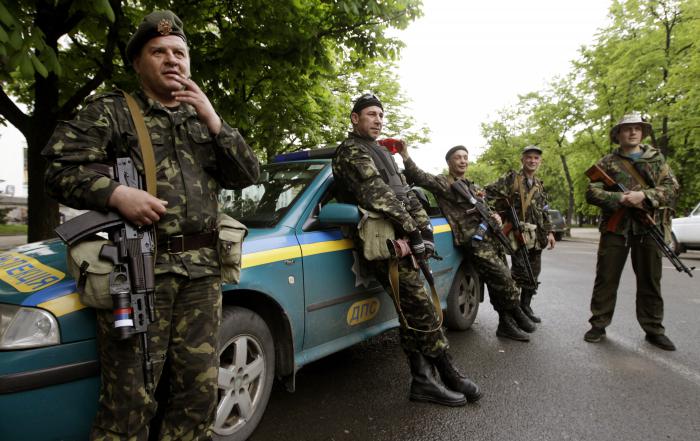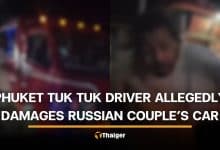Pro-Russians storm Odessa police station, free activists

– World news selected by Gazette editors for Phuket’s international community
PHUKET: Pro-Russian militants stormed a Ukrainian police station in Odessa on Sunday and freed 30 fellow activists as the prime minister blamed police corruption there for dozens of deaths in rioting on Friday.
“Russians won’t abandon their own!” militants chanted as they smashed windows and broke down the gate at the compound, where comrades had been held since Friday’s mayhem. Others shouted “Russia! Russia!” and “we will not forgive!”
Odessa police said 30 activists had been released.
Some police officers were offered the black and orange St. George’s ribbon, a Russian military insignia that has become a symbol of the revolt, and were cheered when they accepted it.
As rebellion simmered, questions were raised about the ability of the army as well as police to confront an uprising Kiev says is backed by Moscow and led in the field by Russian special forces – an accusation the Kremlin denies.
Police in the eastern port of Mariupol said pro-Russian rebels had tricked soldiers at a checkpoint into eating food laced with a sleeping potion. The soldiers were then bundled off along with their weapons, prompting long talks to free them.
Prime Minister Arseny Yatseniuk, speaking in Odessa on the western, Black Sea stretch of Ukraine’s coast, accused Russia of engineering Friday’s clashes there that led to the deaths of more than 40 pro-Russian activists in a blazing building.
But he was pointedly critical of the police.
“If the law enforcement system in Odessa had worked not exclusively on the ‘Seventh Kilometre’ and had protected people, then these terrorist organisations would have been foiled.”
The Seventh Kilometre is an open market on the edge of Odessa, associated in the popular consciousness with the corruption and black market business that have marked Ukraine’s 23 years of post-Soviet independence. He said changes were being made in the leadership of the police in Odessa.
Friday’s clashes were the deadliest since Moscow-oriented president Viktor Yanukovich was forced to flee in February and pro-Russian militants launched uprisings in the industrial east. They also marked the first serious disorder beyond eastern areas since Yanukovich fell, heralding possible trouble for Kiev.
Outright civil war in Ukraine and the division of a country the size of France would have serious implications for countries around, not least for Russia and for NATO states bordering it.
“There were dozens of casualties resulting from a well prepared and organised action against people, against Ukraine and against Odessa,” said Yatseniuk, whose Western-backed government took power after Yanukovich fled and aims to hold a presidential election to replace him in three weeks time.
ODESSA TENSION
Friday’s deaths occurred after running clashes, involving petrol bombs and gunfire, between supporters and opponents of Moscow on the streets of Odessa, where the majority of people speak Russian. The pro-Russian activists were trapped in a building as it burned down.
It was not clear who had thrown the petrol bombs that started the fire but pro-Russian demonstrators at the police station on Sunday blamed pro-Kiev activists.
About 300 pro-Russian activists forced their way into the Odessa police station, gathering in the courtyard, while about a thousand more surrounded the modern complex.
Several police officers stood at the front of the building talking to demonstrators.
Yatseniuk dismissed Russian accusations that his government was provoking bloodshed in the east with an operation to restore Kiev’s authority in a series of cities under rebel control.
“The process of dialogue had begun, only it was drowned out by the sound of shooting from automatic rifles of Russian production,” he said.
Ukraine is divided between a largely Russian-speaking population in the industrial east and Ukrainian-speaking west, where more pro-European Union views prevail. Moscow says Russian-speakers face threats from Ukrainian nationalist militants, an accusation Kiev denies.
Focus of tension on Sunday remained Odessa, traditionally a melting pot of cultures, with pro-Russians accusing Kiev of engineering events that led to the deaths on Friday.
“They are just standing there and shouting for us to release the detainees,” a spokesman for the regional police said.
He said about 170 people were initially detained on Friday, but since then about 50 had been released.
The army suffered an embarrassing upset near the eastern town of Mariupol when soldiers at a checkpoint accepted food offered to them by a group presenting themselves as public spirited citizens. Such donations have been common in recent weeks, as Ukraine’s forces suffer a serious lack of resources.
“It turned out that the food contained a substance that induced sleep among the servicemen,” the acting head of Mariupol criminal police department, Alexei Paniotov, said.
“After about half an hour, about 20 unidentified people arrived in three cars and, taking advantage of their helpless state, took them prisoner along with four automatic rifles, a grenade launcher, a machinegun and ammunition.”
The five soldiers, taken prisoner on Saturday, were released on Sunday after negotiations between police and pro-Russian militants. In the course of the wrangling, pro-Russian activists built barricades through the centre of Mariupol.
There were no signs of Ukrainian forces pushing their declared campaign to remove separatists from eastern cities including Kramatorsk, Donetsk and the rebel stronghold of Slaviansk.
Kiev is organising a presidential election for May 25. However, as things stand, it would have trouble conducting the vote in many parts of the east, a circumstance that would allow Russia to declare any government emerging as bereft of legitimacy.
Russia denies ambitions to seize eastern Ukraine as it has annexed the Crimea peninsula but reserves the right to send troops to defend Russian-speakers if it deems necessary.
Separatists who have declared a “People’s Republic of Donetsk” are planning a referendum on secession next Sunday.
The capital Kiev has remained quiet since the protests that forced Yanukovich to flee to Russia. But celebrations this week marking the anniversary of the Soviet victory in World War Two could be a source of tension.
— Phuket Gazette Editors
Latest Thailand News
Follow The Thaiger on Google News:


























